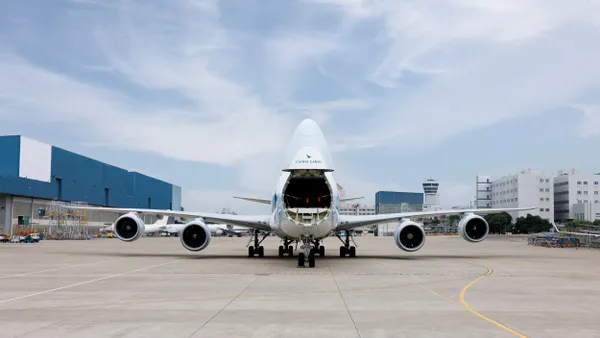Dive Brief:
- Transportation Management System (TMS) startup Haven has launched a free digital freight booking tool, the company announced Wednesday.
- The platform, called "Origin," is carrier-neutral and allows shippers to book transport across all freight modes in one place, using automation to streamline communications and organize documents.
- “Origin ends decades of convoluted, error-prone, and expensive booking processes. For the first time, BCOs and their providers will collaborate on a carrier-neutral platform without either party getting hit with unnecessary booking fees,” said Matthew Tillman, CEO and co-founder of Haven in a statement.
Dive Insight:
Teams spend an average of eight hours per shipment locating status, details and documents across multiple platforms, according to Haven, and this new platform is seeking to cut that time by putting all shipments in one platform and using artificial intelligence (AI) to cut down on communication time.
The platform was born out of a service Haven was already providing to existing customers. Third-party suppliers, tasked with arranging shipments for Haven's customers, which vary from mining and metals company South32 to personal grooming company Walker and Company, were spending too much time on the back and forth required to book and manage shipments on a different platform for every carrier — thus Haven built Origin.
Tillman told Supply Chain Dive the company decided to open the tool up for free in order to drive more customers to its TMS. Being completely automated, the platform requires very little human labor to run.
"It is fully automated, so it doesn't really cost us much honestly. It's a good tool for everyone to use. They don’t have to think about multiple booking sites, and every document can be stored in one location," said Tillman.
By building up the capabilities of Haven's TMS alongside its customers, the company's AI has had access to thousands of documents, transactions, emails and other data it has used to create a fully automated booking platform for all forms of freight.
"The nice thing about getting to scale and getting to volume before releasing a product like this is we already have that data that’s required," said Tillman.
But what does an automated platform that can communicate with freight carriers and forwarders, resolving disputes on its own, do in an industry that is not uniform in its technology adoption? Tillman said over the last two years, the four-year-old startup has developed strategies to work with low-tech players both in developing economies, such as the mining areas of central Africa and small American offices for whom email is as tech-heavy as it gets.
"If your forwarder has only people on the backend, we generate the required information from your files and send it directly to your forwarder ... and then we’re able to parse their response in that email and determine if there’s going to be a dispute generated and automatically resolve the dispute," explained Tillman.














